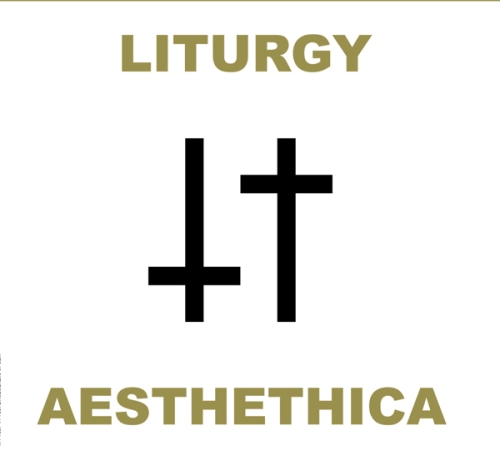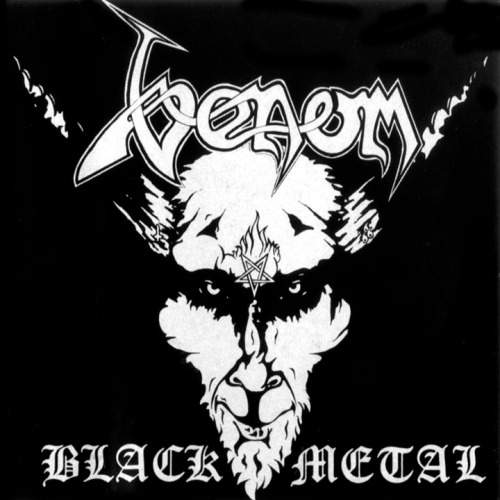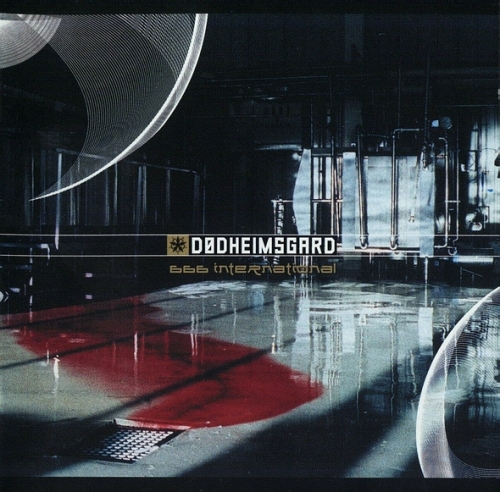Chances are, somewhere along the way you’ve gotten cynical. I don’t know where you’ve come from, and I don’t know where you’re going, but I’ll bet you’ve found yourself staring straight at the concrete slab of ennui. There’s nothing new to hear, no new depths of extremity to be sounded. There’s no more ‘more’, anymore; no more ‘other’ or ‘also’ or ‘what?’ You start walking enough miles in this mucky thicket of heavy metal, or even its motherland – ‘extreme music’ – and many tributaries, and the dull sting of your own soured imaginings is bound to raise its grizzled countenance.
This earth has life, though. New things will stir; bold sapling shoots of equal parts frailty and reckless invention are pushing even now through the cakey topsoil, audacious and recombinant.

Cover art for 2012 album ‘Ursus Americanus’
Enough with the bullshit: Author & Punisher is the mantle adopted by San Diego’s Tristan Shone. Shone has designed and created all the instruments – all the machines – you hear in his one-man outpouring of precise mechanical destruction. Watch a few videos of him recreating these widescreen dystopias in the live setting, and you wouldn’t be alone in picturing Shone as a bleak 21st century version of Dick Van Dyke’s one-man band carryings-on from Mary Poppins.
Spinal Tapdance sent the following questions to Tristan Shone’s techno-bunker; SkyNet obliged to let through the following responses.
—–
Spinal Tapdance: Which came first for you, an interest in building machines or making music? Did you start out wanting to make music only to discover that you were limited by the equipment available to you, or did you start out tinkering with machines and then realize some of them could be turned toward songwriting?
Tristan Shone: I have always made gadgets (since like 2nd grade) and started piano around the same time. I started writing songs on piano in high school, and shortly after picked up guitar and bass. It wasn’t until I had really learned to design and fabricate real machines and robots that I even began thinking of combining the two, which was maybe 10 years ago. The moment of clarity came in art grad school after working in high tech cubicle cleanroom hell (not all boiling hell) for 5 years when really had the chance to reflect on my connection with my own music. I spent a lot of time with my bass, guitar, laptop and a huge soundsystem. I was playing along with sequences and although I enjoy that and still do that now form time to time, there wasn’t enough of my own live, instantaneous, live input; the spastic, “create a clusterfuck in that exact moment” involved with the sequenced setup. I then got rid of my guitar and made a machine that I had to move to make sound…and then another…and then another. They all had a specific purpose and design aesthetic. That was it.
ST: Much of Author & Punisher’s music obviously has more in common with some of the heavier styles of electronic and experimental music (dub, drum and bass, dark ambient, industrial, and so forth) than it does with metal. Do you think of A&P as having a closer affinity to one style or the other?
TS: My base will always be the 80s/90s doom of Neurosis, Melvins, Godflesh, as I broke my teeth on that stuff and never got it out of my system, but since like ‘98 or so I have been focused mainly on all sorts of dark electronic, as you mentioned. It’s much harder for me to find a good, innovative metal band these days, but then again, there are so many goddamn doom bands with crosses on their heads, it’s hard to pick through. 🙂
ST: Your previous full-length album Drone Machines was an all-out assault for nearly its entire length; Ursus Americanus has a bit more ebb and flow, with songs like “Mercy Dub” and “Below and Above You” providing a less oppressive (though still menacing) atmosphere. Was that an intentional songwriting choice, or is it a result of using different hardware for each album? More generally, I suppose, does your songwriting process dictate the types of machines you build, or do your new constructions open up new possibilities?
TS: Good question. Each album is dictated by the machines: Drone Machines are very heavy and slow to move, so the sound is a bit more drrrroooonnneeee and heavy, whereas the new album Ursus Americanus was played on the Dub Machines, which were designed to be lighter, enable a quicker dynamic, and give me to wider spectrum. I wanted Ursus to really be an album representing exactly what I would play live with little to no overdubs. I love how raw and simple Ursus sounds to me; it is not clogged, and that really works out well in a live atmosphere, because with too many sequences and things that I can’t really control, the live performance loses punch. The reason I bring this up, is that Drone Machines has some songs that I love, like “Doppler” and “Burrow Below,” that were written before I started making machines and have a lot of layering, giving them a unique sound, yet a conflicting live setup for me. Half of the DM album is exactly like the Ursus album, all live, no sequence…When I tour the vinyl release of Drone Machines next year, I may bring my bass and do those two songs, because I miss their heaviness.
ST: Your vocals also take a much less prominent role in Ursus Americanus than they did on previous albums. Was that a conscious decision, turning your voice even more into a supporting texture rather than a rhythmic or storytelling vehicle (as on “Lonely” and “Set Flames,” for example)?
TS: Yes, I just didn’t want to be forced to write lyrics for song structure-sake and I guess I didn’t have much to say on this album other than “Lonely”, ha. I feel much more meaning in the mood of my music and effect of the sound. That being said, I probably use my voice more on this album. I like to think of it like a good dub or hip hop track where maybe there is one line and then a string track and you think: “yeah it’s Sunday afternoon and I’m going to eat fried clams,” bam. No lyrics necessary.
ST: Godflesh seems like an almost unavoidable comparison, but were there any other acts in particular that originally piqued your interest in this type of metal/heavy electronics fusion? The absolutely massive climax of album centerpiece “Set Flames,” for example, reminds me a bit of Neurosis, albeit fed through some horrific digital wood-chipper.
TS: Exactly. I mean, I liked those aforementioned bands a lot, along with His Hero is Gone, Jesu, Nile, Meshuggah, but I it was always alongside a lot of drum and bass, dub, dubstep, electro, some industrial. One that sticks out was Ed Rush and Optical, they had some great dark simple tracks. I really like some gabber stuff, but I really missed the boat on that as I was listening to US metal and hardcore. I really wanted my high school band, which was a blast and I will always remember, to play super heavy slow stuff, like the last track off of every Godflesh album that lasted 20 minutes, but it was actually really hard to find people to play with that were into that. I kind of gave into it from like ’96 to ’03, until I broke up with the last band and knew that was it, A&P from then on. I’ll just walk around a lot of the time and come up with all sorts of different heavy riffs…the shower is a good place for that.
ST: The aesthetic appeal of Author & Punisher seems pretty clearly tied to the fusion of the human/organic and the mechanical. What is it about that fusion that appeals to you? Is it about surpassing the limitations of the organic? Is it a fetishization of machines and industry? Is there anything about it that’s cautionary or anxious about the impact of technology on humanity?
TS: I am trying to be as natural as possible with my designs, meaning that I like to avoid relational aesthetics as a practice. I like quality materials that and I like machines that are made with extreme prejudice and precision and attention to detail so that they function flawlessly. This can be a shaft spinning smoothly on a bearing so that there is no slop, or a handle that feel cold in your hand, so you know it’s steel or brass, etc. etc. If this is fetishistic, then I guess that can be said, but for me, as an engineer and musician, it is good engineering practice applied to the world of electronic music where things are fabricated out of total shit plastic. I have said this before, but if I had more time I would release A&P vacuum cleaners and blenders because they are also total pieces of shit and can be designed out of better stuff. In terms of human machine, that is also just simple HCI design (Human Computer Interaction), where you try to improve that relationship so it works better.
ST: I mean, let’s be honest: isn’t this whole machine-music thing just your attempt to be shown mercy by our new robotic overlords following the inevitable technopocalpyse?
TS: I’m afraid my robots are too simple to be even shown the slightest bit of mercy…the robot oppressors will be bacteria-powered, virus-driven, super-efficient bio-machines that will just urinate and destroy all.
ST: Is there any particular machine you’ve invented of which you’re the most proud, or maybe one that was the most difficult to get just right?
TS:I have a special relationship with all of the machines, but probably like the Rails the best: rock solid. The Throttles is a pain the ass and needs some work internally to fix the motors and linkages, which will need to happen soon before the Spring DM tour!
ST: Do you think of your studio albums and live performances in mostly the same terms? That is, do you think the experience of hearing Author & Punisher in the live context is a significantly different experience from listening to the album?
TS: I think of them as the same, but the listener can’t possibly, because live you are watching the sound be made by the movement or hit, meanwhile getting knocked in the gut by a wall of sound. Listening to the album you have to imagine this and you may not get the same effect, however the albums are a somewhat “perfected” version of the live songs, so that can be a more balanced experience.
ST: Are there any current plans for touring the Ursus Americanus material? Do you think it’s any more or less difficult for you to tour than for a band with a more traditional instrumental set up?
TS: Touring is increasing exponentially right now with a few shows on the East Coast and fests coming up. Stay tuned. It’s pretty easy for me to tour actually, since I don’t need speakers since a lot of clubs have good sound. I do bring my sound system for the odd bar that has tweeters blown or douchebag sound guy :).
—–
Many thanks to Tristan for answering our questions, and to Kim Kelly of Catharsis PR for wrangling and mediation. Author & Punisher recently released a professionally-done (and quite unsettling) video for Ursus Americanus‘s “Terrorbird”:
For more information on Author & Punisher (and Tristan’s other exploits), head to the man’s website. You can purchase Ursus Americanus from Seventh Rule Recordings here, or stream and/or purchase it and previous A&P albums at Tristan’s Bandcamp page.





